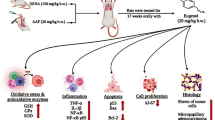Abstract
The scope of the present study was to investigate whether nicotine or cotinine will affect the metabolism of 4-(methylnitrosamino)-1-(3-pyridyl)-1-butanone (NNK) in isolated perfused rat lungs and livers and to study the effect of starvation on pulmonary metabolism of NNK. NNK metabolism was investigated in isolated perfused liver and lung of male F344 rats perfused with 35 nM [5-3H]NNK in presence of a 1400-fold excess of the main tobacco alkaloid nicotine and its metabolite cotinine. In perfused rat livers, nicotine and cotinine inhibited NNK elimination and metabolism and led to a substantial increase of elimination half-life from 14.6 min in controls to 25.5 min after nicotine and 36.6 min after cotinine co-administration, respectively. In parallel, the pattern of NNK metabolites was changed by nicotine and cotinine. The pathway of α-hydroxylation representing the metabolic activation of NNK was decreased to 77% and 85% of control values, whereas N-oxidation of NNK and glucuronidation of 4-(methylnitrosamino)-1-(3-pyridyl)-1-butanol (NNAL) was increased 2.6- and 1.2-fold in presence of nicotine and cotinine, respectively. When isolated rat lungs were perfused with 35 nM NNK for 3 h neither the elimination nor the pattern of metabolites were substantially affected due to co-administration of 50 μM nicotine or cotinine. Cytochrome P450 2E1 is known to participate in the activation of NNK and can be induced by starvation. However, isolated rat lungs from male Sprague Dawley rats perfused with [1-14C]NNK at about 2 μM for 3 h, revealed only small differences in pulmonary elimination and pattern of NNK metabolites between fed and starved animals.
These results suggest that nicotine and its main metabolite cotinine inhibit the metabolic activation of NNK predominantly in the liver whereas activation in lung, a main target organ of NNK induced carcinogenesis, remained almost unaffected.
Similar content being viewed by others
Author information
Authors and Affiliations
Additional information
Received: 13 March 1997 / Accepted: 21 November 1997
Rights and permissions
About this article
Cite this article
Schulze, J., Schrader, E., Foth, H. et al. Effect of nicotine or cotinine on metabolism of 4-methylnitrosamino-1-(3-pyridyl)-1-butanone (NNK) in isolated rat lung and liver. Naunyn-Schmiedeberg's Arch Pharmacol 357, 344–350 (1998). https://doi.org/10.1007/PL00005177
Issue Date:
DOI: https://doi.org/10.1007/PL00005177




